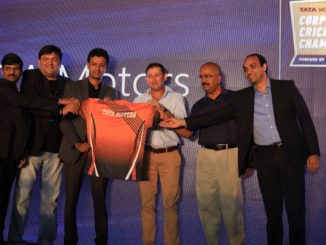- Executives expect a major business model disruption by the end of this decade
- Executives and customers weigh in on use of car and customer data
Automotive industry executives agree that connectivity and digitalisation could collectively be the most important trend that could hold through 2016 to 2025. According to the seventeenth annual KPMG International Global Automotive Executive Survey (GAES) released today, this is a significant jump from its ranking (10) last year.
This year, 800 auto executives from 38 countries (including 74 executives from India) gave their insights to KPMG on business model disruptions, connectivity and digitalisation, customer data, new products and the players who are expected to survive in this constantly evolving industry. 82 per cent of the auto executives surveyed expected a major business model disruption in the next five years.
For further understanding, KPMG also surveyed over 2,100 customers globally (including 200 from India).
Dieter Becker, KPMG’s Global Head of Automotive, comments, “The ever-changing service and data-driven business models should pave the way towards owning, securing and retaining the key stakeholder – the customer. In order to meet their current needs, becoming a customer-oriented service provider is of utmost importance. One way traditional car makers can add value and offer customised client experiences is by leveraging the massive amount of data that both the car and its driver(s) produce.”
Almost 20 per cent of all the executives surveyed, especially those coming from the growth markets of China and India, and ASEAN, opine that by 2025 Original Equipment Manufacturers (OEMs) could simply become contract manufacturers for Information and Communications Technology (ICT) companies.
According to 95 per cent of the respondents from India, the volume segment of the industry is likely to witness a disruption in the years ahead.
Rajeev Singh, Partner and Head, Automotive sector, KPMG in India said, “Connectivity and digitisation are likely to impact all automotive companies in India. Volume and mass market manufacturers are also expected to be affected as they are prone to lose customer relationships in the future to new entrants (likely from the ICT sector) in this space.
Emerging trends in the Indian market indicate increasing preference by users to remain connected while using/driving their vehicles. Few applications already aid in establishing connectivity between smartphones and vehicles. Data is going to play a key role in the service and marketing of vehicles to Indian customers.”
Data for cash
However, according to the KPMG GAES report, the majority of auto executives say the use of data and the application of informational engineering is still at a nascent stage.
Around 91 per cent of the respondents were unanimous in their agreement that vehicle manufacturers in India are currently using informational engineering in connectivity related services such as predictive consumer analytics. A change in consumer mind-set is likely to take place as customers are becoming increasingly aware of the value of their data and may not be willing to provide it to third parties without receiving considerable direct incentive or reward.
Becker states, “Indeed, customers are aware of the value of their data and KPMG’s GAES results show that for these stakeholders, cash is king. A majority of the customer respondents across all age groups said that monetary benefits for their data is the most attractive benefit, followed by customer incentive schemes, and individualised service and customer experience.”
Rajeev states, “Intelligently combining the data generated by the vehicle itself (upstream data) and by passengers in the car (downstream data) will be the key to survive for automotive companies. The key question to be answered in future is who owns the up- and downstream data generated in a vehicle.80 percent of the survey respondents from India have rated Big Data as extremely important ahead of other trends such as autonomous / self-driving cars.
A change in consumer mind-set will take place: Tomorrow’s customers will be increasingly aware of the value of their data and will not be willing to provide it to third parties without receiving considerable direct incentive or reward.”
76 percent of the survey respondents from Industry in India have rated powertrain technologies for hybrid electric vehicles as number one priority for investment in the next five years. This is surprisingly far ahead of investments planned in other trends such as battery operated powertrain and Downsizing / optimization of the internal combustion engine (ICE).
Factors of influence
Key product features that are likely to influence consumer purchasing decision with respect to the the automobile industry in India in the next five years were identified as safety innovation and environmental friendliness,, ahead of other features such as brand image, ergonomics and comfort, fuel efficiency and use of alternative fuel technologies (fuel cell electric power, bio-fuels, solar power, etc.).
The executives surveyed are optimistic that traditional manufacturers are likely to be groundbreaking innovators in the future. However, as they are facing a new highly digitalised and connected age with numerous new players, OEMs seem to be aware that these developments are not yet reflected in their business models.
The most influencing macroeconomic changes likely to impact strategies of automakers, according to Indian respondents are financial or economic crisis (96%) which shows that last crisis had enormous impact on the automotive industry and is still present in the minds of executives. Oil price volatility (95%) and Fluctuating / instable raw material costs (92%) are other factors likely to influence strategies of automotive companies in India.
Rajeev concludes:
“New business models such as ride sharing, platform consolidation to reduce cost of manufacturing, contract manufacturing, and emergence of Big Data to understand the unknowns, will pose both as an opportunity as well as a challenge. In a decade’s time market share in India is likely to be decided on data and revenues generated by the customer while driving in fully connected vehicles rather than just selling cars on high volume basis.”
Almost half of the respondents from India also believe that legislation/regulation may influence the developments and trends in the Indian automotive industry. Changes in reforms of vehicle safety, emissions, end-of life of vehicle, etc. are expected to help accelerate India’s position as a leading automotive market, as well as a preferred destination for investment.
About KPMG’s Global Automotive Executive Survey 2016
This year executives from across the world answered our questions, of whom around half are C-level executives or CEOs, presidents or chairpersons.
The respondents represent companies of all parts of the automotive value chain, including vehicle manufacturers, Tier I, II and III suppliers, dealers, financial services providers, mobility service providers and, for the first time, ICT companies. Over two-thirds of all participants are from companies with annual revenues greater than USD1 billion, of whom 40 per cent even have revenues of more than USD10 billion. The survey was conducted online and took place between July and November 2015.
Also, for the first time, 2,123 customers from around the world, across all ages and educational backgrounds were interviewed for insights, perspectives and opinions.
All the survey data is now available at www.kpmg.com/GAES2016 in an interactive online tool where users can compare statistics by country, region, question asked and more.
A copy of KPMG’s Global Automotive Executive Survey 2016 can be also found at www.kpmg.com/GAES2016.
About KPMG International
KPMG is a global network of professional services firms providing Audit, Tax and Advisory services. We operate in 155 countries and have 174,000 people working in member firms around the world. The independent member firms of the KPMG network are affiliated with KPMG International Cooperative (“KPMG International”), a Swiss entity. Each KPMG firm is a legally distinct and separate entity and describes itself as such.

